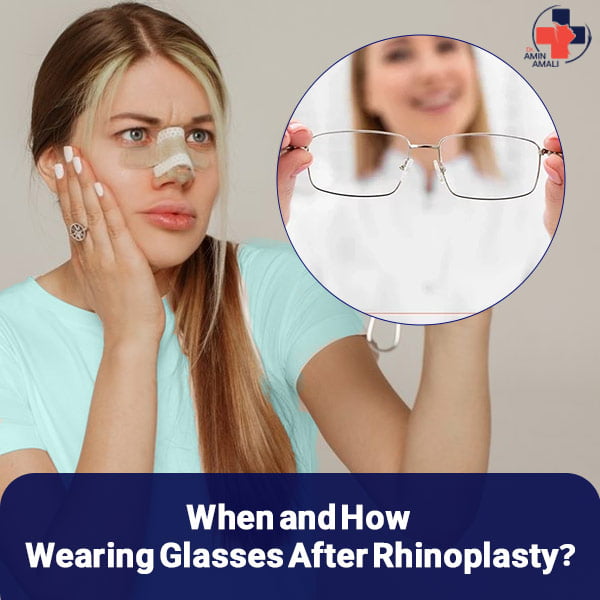Should I wear glasses after rhinoplasty? This is a question that many rhinoplasty candidates ask themselves. Wearing glasses after rhinoplasty is a major concern for people who are considering this surgery, as the pressure exerted by the glasses can affect the healing process and the final shape of the nose. In this article, we will discuss when you can wear glasses after rhinoplasty and what you need to consider when using glasses after rhinoplasty.

When can I wear glasses after rhinoplasty?
In general, it is recommended to avoid wearing glasses for at least 4-6 weeks after rhinoplasty. This is because the bones of the nose have not yet fully healed during this time and the pressure from the glasses can cause them to shift or deform.
If you must wear glasses before your nose has fully healed, you can take some precautions to minimize the risk of complications:
- Choose lightweight glasses made of plastic or titanium.
- Use glasses with adjustable nose pads to distribute the weight evenly.
- Do not rest the glasses on the bridge of your nose. Instead, wear them so that they rest on the cheeks or temples.
- Limit the amount of time you wear glasses each day.
What other things should I consider when wearing glasses after rhinoplasty?
- Be gentle when putting on and taking off your glasses.
- Avoid blowing your nose too hard.
- Do not wear glasses during strenuous activity.
- If you experience any pain or discomfort, stop wearing your glasses and see your rhinoplasty doctor.
Complications of Wearing Glasses After Rhinoplasty
Wearing glasses after rhinoplasty can lead to complications, especially in the first weeks and months after surgery. The most important complications include:
- Pressure on the nose: Glasses, especially heavy or ill-fitting ones, can put pressure on the bridge of the nose and its delicate bones. This pressure can lead to pain, swelling, bleeding, and even deformity of the nose.
- Delayed healing: The pressure from glasses can delay healing and increase the risk of infection.
- Scarring: If glasses do not fit properly on the nose, their sharp edges can rub against the delicate skin on the bridge of the nose and cause scarring.
In addition, wearing glasses can:
- Dry eyes: Glasses can reduce airflow to the eyes and lead to dryness, itching, and burning.
- Fatigue: Keeping glasses on your face can be tiring and lead to headaches.
What can be used instead of glasses after rhinoplasty?
As mentioned earlier, after rhinoplasty, the use of eyeglasses is prohibited or limited for a period of time due to the sensitivity and vulnerability of the nose. However, there are alternatives to eyeglasses that you can use during this period:
Contact lenses
The most common alternative: Contact lenses, especially soft contact lenses, can be a convenient and comfortable alternative to glasses during this period.
Advantages of using contact lenses after rhinoplasty
- No pressure on the nose
- Wider field of vision
- More natural appearance
Disadvantages of using contact lenses instead of glasses
- Requires more care and maintenance
- Risk of dry eyes and infection
- Higher cost
Important points about using lenses after rhinoplasty
- Consult with your doctor before using contact lenses.
- Use appropriate and high-quality contact lenses.
- Carefully follow the hygiene instructions for using lenses.
Special glasses after rhinoplasty
These are light and delicate glasses that rest on the cheeks instead of the bridge of the nose.
Advantages of using special glasses after rhinoplasty
- They put less pressure on the nose.
- They are suitable for short periods of time.
Recommendations for people with poor eyesight who are considering rhinoplasty
If you are planning to have eye surgery or LASIK, we recommend that you have it done before rhinoplasty. Otherwise, it is best to purchase contact lenses and use them instead of glasses during your recovery period. If you are unable to use lenses for any reason, you can tape your glasses to your forehead or use a glasses holder to protect your nose from pressure.
Here are some additional tips for people with poor eyesight who are considering rhinoplasty:
- Talk to your doctor about your options. They will be able to advise you on the best way to manage your vision during and after surgery.
- Make sure you have a good supply of contact lenses or glasses. You may not be able to wear your glasses for a few weeks after surgery.
- Be prepared to adjust your vision care routine. You may need to use different types of contact lenses or glasses after surgery.
- Be patient. It may take some time for your vision to fully adjust after surgery.












